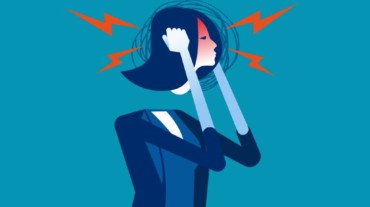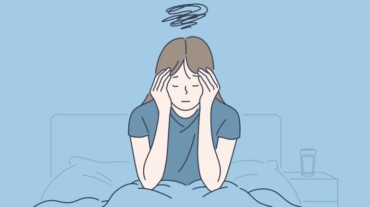
Has your office life turned particularly painful recently and the reason isn’t the increased work pressure or simply the monotony of your job? If you’ve not guessed already, we’re talking about the headaches that you might be suffering from a lot these days while at work.
According to Dr. Praveen Gupta, director and head of department, Neurology, Fortis Memorial Research Institute, in most cases, a splitting headache might be caused due to the following factors:
1. Atmospheric triggers
Fluorescent lights, bright lights, and certain smells in and around your work desk can trigger a nerve inside the brain called the trigeminal nerve, which is basically responsible for sensation in the face as well as for motor functions such as biting and chewing. This in turn can lead to migraine or a severe headache that might make it difficult for you to sit through the day.
2. Dehydration and caffeine overdose
Sipping on coffee to stay awake and attentive at work can really dehydrate your body. Not to mention, not drinking adequate water while flipping while typing out that report can make your situation worse. This is because dehydration can lead to thickening of blood and result in a severe headache.
Also, watch:
3. Technological overdose
Sitting and staring point blank at your computer screen to finish an important work presentation or simply spending hours at a stretch to feed important data into the computer system is another reason why your head might be bursting while you’re at work.
This is because computer screens tend to emit radiations which can lead to abnormal neuro activities and cause headache. Computer screens can additionally weaken your eyesight and lead to headaches as well.
Is it serious though?
According to Dr Gupta, the headaches could be due to serious as well as non-serious reasons.
“If you have a history of chronic headaches such as migraine or cluster headaches, or headaches triggered by exercise, cold, or due to other stimuli mentioned above, you needn’t worry,” he says.
“A migraine, increased stress, trigeminal autonomic cephalalgias (characterized by pain in one side of the head which usually lasts for a shorter duration), and other primary headaches not caused due to an underlying medical condition are some of the less serious forms of headaches that one might experience at the workplace,” he adds.
Select Topics of your interest and let us customize your feed.
PERSONALISE NOW
So, when should you be alarmed?
“A sudden, severe splitting headache that occurs for the first time or a recent onset of splitting headaches could be indicative of a change inside of your brain such as sudden internal bleeding in the brain (subarachnoid haemorrhage), a blockage inside the nerves of the brain, or developing swelling inside the brain,” Dr Gupta warns.
Following are the types of headaches you mustn’t be taken lightly:
1. A sudden, severe, thundering headache: It can indicate a sudden bleeding in the brain.
2. Severe headache accompanied by neck stiffness: This is also a classic case of a subarachnoid haemorrhage, where a balloon or a weak spot in your arteries gets ruptured, giving rise to bleeding inside the brain.
The blood irritates the brain meninges (membranous envelopes surrounding the brain and the spinal cord), which causes the neck to become stiff. This is a medical emergency but is treatable with timely diagnosis.
Also, watch:
3. Headache with numbness: The numbness in any part of the body along with a headache can indicate a swelling in a certain part of the brain, which hinders that body part’s proper functioning.
4. One-sided severe headache, vomiting, and teary eyes: This could be due to paroxysmal hemicrania, which can be relieved with non-steroidal drugs. Just like migraine, it can be triggered by certain foods, exercise, and temperature changes–though the cause of this pain is still unknown. And just like migraine, this type of headache may be accompanied by nausea, vomiting, teary eyes etc.
5. Headache with neck and face pain: This can occur in case of many situations such as migraine. It can also be due to trigeminal neuralgia, which causes a current-like pain in the head and face. Headaches with severe piercing sensation, sweating and facial numbness could also indicate an autonomic dysfunction.
6. Headache accompanied by nausea, vomiting and sensitivity to light and sound: This is mostly due to a migraine if this has been happening to you for a couple of months or years. However, if this problem has just started, do not strike it off labelling it as migraine until your neurologist has given you a clean chit because sometimes, serious disorders can trigger migraine-like headaches.
7. Headache accompanied by vision problems: This could be a sign indicating that the nerve going from your eyes to your brain is getting pressed. Hence, the pressure may be raised in the eye or in the head, which can be caused by a benign condition called pseudotumor cerebri (a condition caused due to increased pressure inside the skull for no obvious reason), which is very common in middle-aged women or due to an actual swelling/tumour/infection/inflammation in the brain.

8. Headaches accompanied by fever: Apart from being a typical symptom of a regular flu, if your headaches are accompanied by fever and an unintentional weight loss, you should be taking it seriously as these are signs that could be indicating that certain part/parts of your brain might not be functioning properly and that you need an immediate and urgent diagnosis.
So, what should you do to avoid this tedious situation?
“Headaches are best prevented with a disciplined lifestyle. This includes eating proper meals, sleeping on time, taking adequate rest, avoiding looking at a screen continuously, decreasing cell phone exposure, decreasing caffeine intake, staying hydrated, exercising your neck regularly, avoiding undue stress and headache triggers such as certain smells,” Dr Gupta suggests, while signing off.